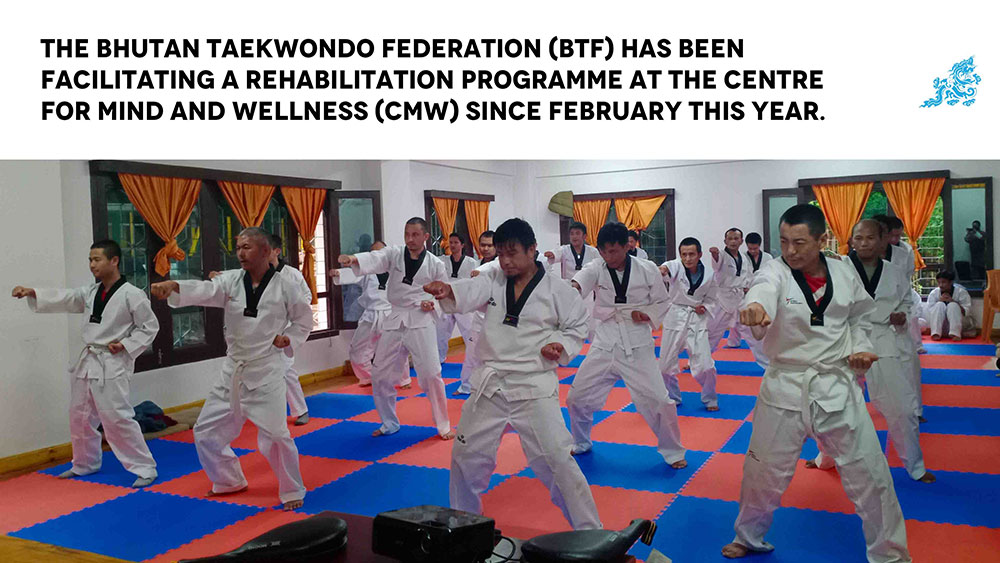Taba, Thimphu – Empty room, a butter lamp burning on a small makeshift altar. I have been sitting here, alone, for about five minutes. Spotless walls, beautifully matted floor and near-total silence lends a serene atmosphere to this whole layout that I keep thinking I have at long last entered a hermit’s sanctuary in search of a deeper inner peace.
Suddenly, I hear footfalls in the corridor. A group of youngish-looking men in dobok (taekwondo training uniform) come rushing in. There is excitement on their faces. As a mark of respect, the boys bow to their coach. My quest for inner peace is gone.
“How was your day?” asks Kinley Penjore, the coach. In unison: “Great!” The training has begun for this lot, all white-belters, 56 of them who, I am told, are undergoing rehabilitation at the Centre for Mind and Wellness (CMW). They are in the process of recovering from alcohol and drug use.
The programme, Kinley Penjore tells me, is to engage them gainfully and to make taekwondo more accessible. The year-long programme is being funded by the Asian Development Foundation (a foundation that aims to cultivate talent and exchange among the Asian countries) in collaboration with World Taekwondo, an international federation governing the sport of Taekwondo.
Bhutan Taekwondo Federation (BTF) has been facilitating the programme in Taba, Tshaluna, and Paro. The programme is expected to augment productive activities at the rehabilitation centres which until now has been focusing largely on counselling and meditation.
Since February this year, taekwondo has been the daily activity at CMW between 4pm and 6pm. The participants learn basic taekwondo techniques such as straight punch, body twist, jump, pushups besides taekwondo language, in Korean. The day’s programme ends with meditation to calm their mind.
Gopal, 31, from Sarpang, is battling alcohol use disorder (AUD) at the centre. Taekwondo, he said, made him a more responsible person. Through the sport, he has learnt how to manage time.
“During my school and college days, I used to think that taekwondo is only for taekwondo athletes. By participating in this programme, I came to know that taekwondo is all about discipline, self-defence, and mindfulness, rather than just winning medals,” Gopal said.
Besides, it is fun. “For the people like us, such an engagement programme makes us forget our past and look to the future,” he said.
At the centre, the day begins at 5:45am with jogging which is followed by counselling, taekwondo, prayers, meditation and gardening, among others. All routines close by 10pm.
Many here say that physical exercise plays a vital role in keeping themselves away from drug and alcohol use. For some, recovery has been a long and difficult journey.
Tenzin Dendup, 40, from Bumthang, agrees. He has been able to manage time well. “It comes with determination and practice. I had lost sense of time when I was heavily into alcohol. I now feel fit and can do everything that I feel I should.”
He has seen worse. Some of his friends could barely walk when they first came to the centre. “Now, with the help of physical exercise and taekwondo, most are healthy. It takes time to regain normal body weight. Exercise is needed to keep oneself fit.”
Cell phones are not allowed at the centre. This, I am told, is one of the ways to help the clients focus on their recovery.
Yeshi Wangdi, 21, is the youngest client at the centre. He said distraction was his biggest enemy. “I had to quit my studies due to alcohol addiction. I regret but I am a better person today. The programmes here have played a huge role in shaping my outlook and future.”
Gaza from Paro, 56, is one of the oldest in the group. He was a taekwondo player in the 1980s but alcohol ruined it all. “I had a dream to continue but couldn’t due to addiction. It’s like a refresher course for me and brings back a lot of memories.”
As I watch them train, I wonder whether they would be able to stay clean after they leave the centre. Relapse is a major problem among clients that have undergone rehabilitation programmes.
Kinley Penjore says after they leave the centre the clients can join BTF. “This, hopefully, will prevent them from relapsing.”
By Thinley Namgay
Edited by Jigme Wangchuk


